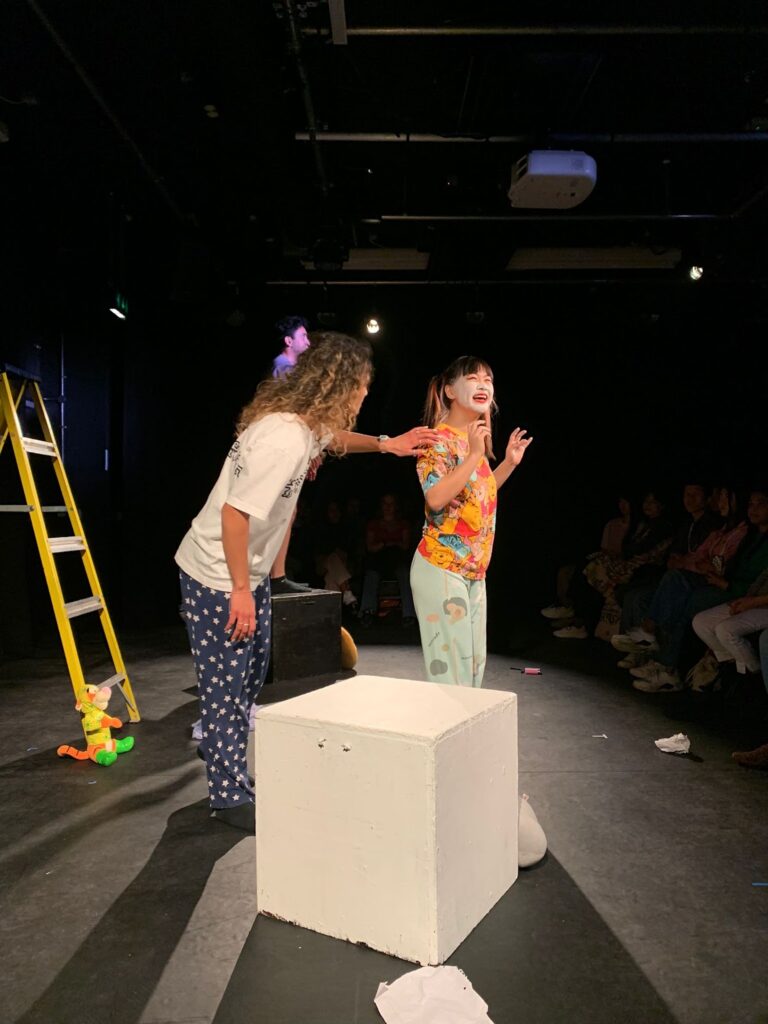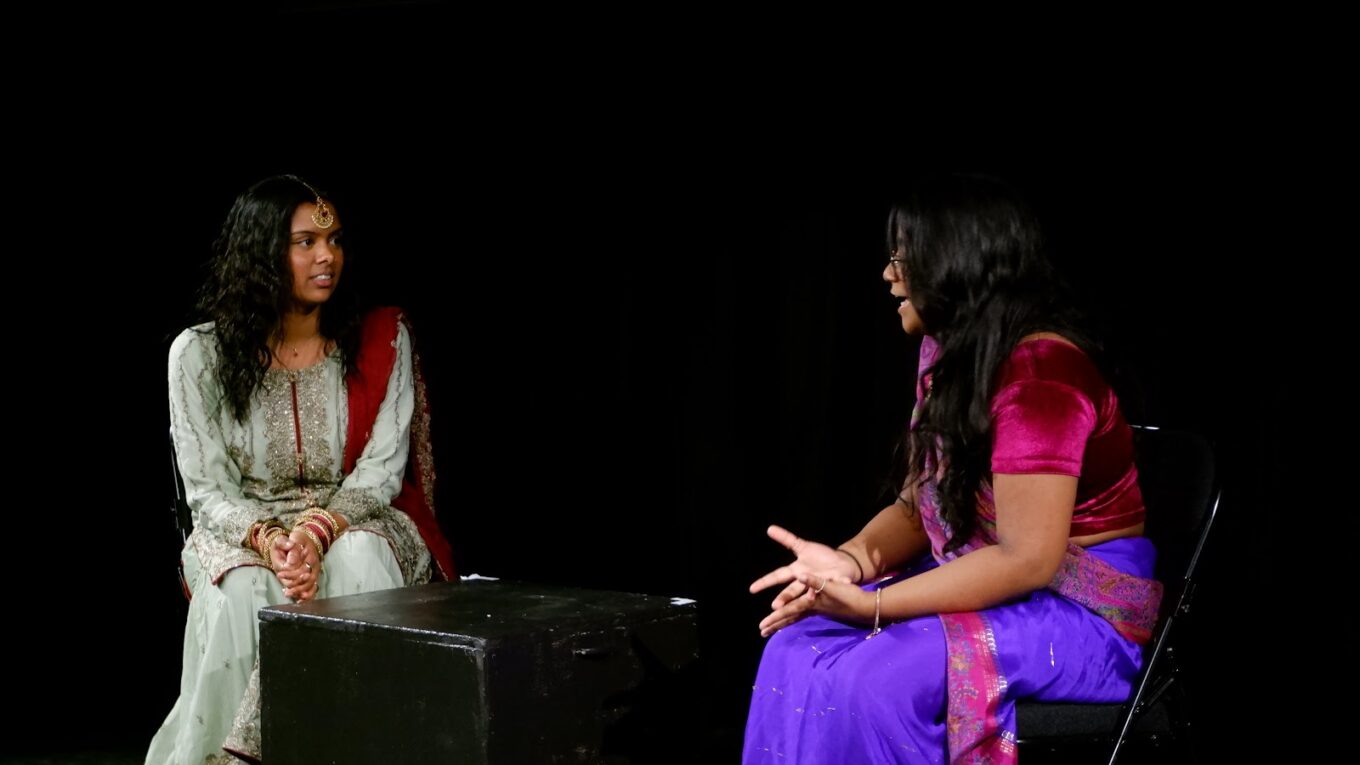KAY LYNN ER, student playwright, enters the dialogue on diversity in storytelling and envisions a truly diverse London theatre.
“Tomar Hat” (written and directed by Nabilah Delowar), produced as part of Reclamation 2022. Pictured: Nabilah Delowar and Jessica Alagaratnam
In my first week at UCL, like most freshers, I joined a long list of societies. The Drama Society was one such society. During Freshers’ Week, they posted an Open Call for bids to put on a play as part of their annual Black, Asian, Minority Ethnicity Festival, otherwise known as Reclamation 2023. Being 1. Asian 2. a theatre-maker and 3. a writer looking to have one of my plays produced, I submitted a bid by the end of that week. Reclamation 2023 is a festival seeking to showcase works by and about Black, Asian, and Minority Ethnicities, aiming to increase the inclusion of such artists in the UCL community. In the run-up to the festival, there are a few questions that keep crossing my path and my mind.
First, what does inclusion mean in the theatre?
More importantly, why does inclusion matter? Just walking around London the diversity of its people is evident. The level of cultural exchange happening on the internet, in our airports, and in our cities has increased. London’s cultural make-up has changed, and with it the number of different cultures we are exposed to on a daily basis. If we accept the belief that theatre ought to reflect reality and imagine new realities, then the theatre industry needs to catch up to the world around it.
On the British stage, there has undoubtedly been a push to increase the diversity of artists in the theatre (not just based on race, but on gender, sexuality, etc.). I see the larger goal of inclusion as being composed of two subgoals. Firstly, increasing numbers of minority artists in the industry. Secondly, increasing dialogue around the stories of minority communities. Many theatre companies in the UK incorporate ‘diversity, equality, and inclusion’ programmes into their structures. The extent to which the programmes attempt to achieve both goals varies, and accordingly, we see that their effectiveness therefore varies as well.
Second, how much do traditionally under-represented communities, and theatre as a whole, benefit from such programmes?
In this section, I refer to ‘diversity, equality, and inclusion’ programmes which merely hire minority artists without changing the companies’ season lineups in ways that would complement their aims of chasing inclusion. In Singapore (where I am from) and around the world, there are many wonderful companies who support the development of new local writing and stage plays dealing with the local experience. So, isn’t it unfortunate that when people from beautifully diverse cultures move to an equally beautiful, cosmopolitan city like London and attempt to find work on the stage, many opportunities seem to ask them to assimilate themselves into Western Eurocentric culture and stories?
Of course, we may speak of the universality of theatre and its stories here, but when we tell artists with complex cultures and stories of their own to erase the backgrounds they bring with them, is that true inclusion? Simply casting an actor of a minority race in a production of “A Streetcar Named Desire” and calling it a day does not really do much for inclusivity. Of course, it gives opportunities to such artists and literally includes them in the industry (both extremely important goals), but if this is unaccompanied by any real, tangible effort to increase the levels of cultural exchange and dialogue in theatre (an equally important goal), then I see it as a mere superficial stab at the deep-rooted problem we face as an industry.

Third, as a theatre maker who belongs to an ethnic minority in the UK, what am I complicit in?
Are such programmes, in their pursuit of inclusion, actually exclusionary? There was an interesting comment made in relation to the Drama Society’s Reclamation festival a few days ago (at the time of writing). Someone asked if there was a lack of diversity in the regular plays put on at UCL and, if not, what was the point of a POC [person of colour] only production? This person raised a valid line of questioning. Since the festival’s aims are at increasing inclusion of and opportunity for POC artists, then we may ask if outside of this festival there are limited opportunities for and inclusion of such artists. As far as I’m aware, the answer is no. Yet, we may think of Reclamation as the society’s attempts to achieve the second subgoal, with its attempts to achieve the first seen through open auditions (for plays where the story is not heavily rooted in a certain culture or experience) and an open bidding process for all members of the society. Is this exclusionary?
By definition, yes. A white playwright, for example, would have one less festival or opportunity to bid for. But this argument could be extended infinitely. A woman has roles she cannot audition for because of the requirements of the production, and likewise for men. We then forget that such initiatives exist to break traditional barriers to entry for minority artists working in an industry where, let’s face it, most of the audience and executives of theatre companies, do not look like them. The canonical works of Western European writers, and the works of present-day Western European writers, permeate our cultural consciousness. It is hard to think of theatre without thinking of Shakespeare or Beckett. To increase the breadth of our thinking around theatre, and because it is human to stay with what we are familiar with, targeted action is necessary.
The fact is, simply casting minority actors in, or attaching minority directors to plays written by Eurocentric writers does little for inclusivity. Instead, doing so inherently privileges Eurocentric stories and sends the message that minority artists ought to simply assimilate into existing storytelling traditions and cultures. If we want to talk about inclusivity, then we must go beyond increasing the proportion of working artists from traditionally under-represented groups. Inclusivity, to me, is more importantly about increasing the number of diverse voices we have on our stages, and I believe this must be achieved through the incorporation of stories from such groups into our artistic diet, and the encouragement of cross-cultural dialogue in our theatres.
This year’s ‘Reclamation’, UCL Drama Society’s BAME Showcase 2023 will be taking place November 2nd and 3rd.






